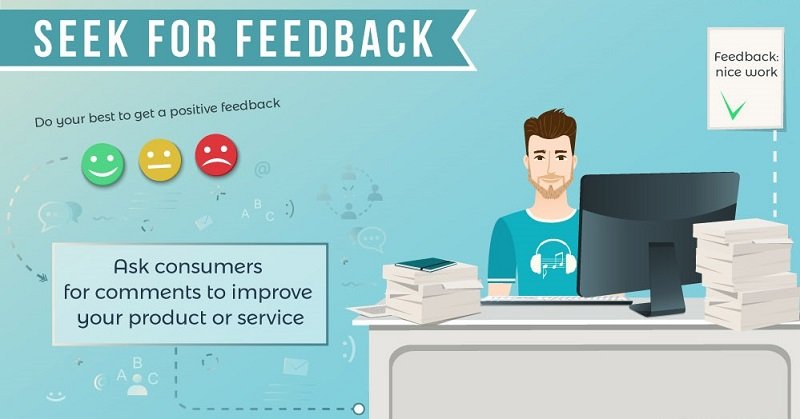9 Insanely Effective Steps To Turn Your Hobby Into Business [Infographic]
What is your hobby?
Do you write poems, draw pictures, bake cupcakes, play guitar? (You name it!)
And what if I say you can monetize this hobby and turn it into a profitable business? Everything you need is a little arrangement and strategic realization.
Indeed, five in ten people gain income from their hobbies today. If you feel it’s just a right kind of time to join them, here goes the infographic for you to pave the way for success.
In addition to that, want to know what is the best paper writing service reviews?
It’s aimed at motivating you to get a foot in the door and revealing the steps to take for an effective start.
So, let’s the game begin?
 Use this Embed Code for publishing the infographic at your website:
Don’t forget to share the infographic with friends who are, probably, in need of a kick in the back to start a business.
And keep on reading to learn more.
Use this Embed Code for publishing the infographic at your website:
Don’t forget to share the infographic with friends who are, probably, in need of a kick in the back to start a business.
And keep on reading to learn more.
 3) Craft a plan
Writing a business plan will outline all aspects of your future business and let you see how to implement them.
A good plan includes:
3) Craft a plan
Writing a business plan will outline all aspects of your future business and let you see how to implement them.
A good plan includes:

 Start with providing free services to build a portfolio that will sell you afterward. If you give guitar playing lessons, you might make every first lesson free for new clients.
If you sell a product, then network with influencers in your niche and send them free samples, asking for the feedback. Most of them have thousands of loyal followers who might become your first customers.
[tweetthis]Start with providing free services to build a portfolio that will sell you afterward.[/tweetthis]
Start with providing free services to build a portfolio that will sell you afterward. If you give guitar playing lessons, you might make every first lesson free for new clients.
If you sell a product, then network with influencers in your niche and send them free samples, asking for the feedback. Most of them have thousands of loyal followers who might become your first customers.
[tweetthis]Start with providing free services to build a portfolio that will sell you afterward.[/tweetthis]
 Come up with a brand name
Choosing a right brand name for your business is crucial, but it’s a huge challenge to come up with a unique idea.
It happens that others have already taken all cool names. Annoying, isn’t it?
Use name generators! Fortunately for us, Mark Macdonald from Shopify has written the article “10 Business Name Generators to Help You Create Your Brand.” You get to choose.
Here go several moments to keep in mind:
Come up with a brand name
Choosing a right brand name for your business is crucial, but it’s a huge challenge to come up with a unique idea.
It happens that others have already taken all cool names. Annoying, isn’t it?
Use name generators! Fortunately for us, Mark Macdonald from Shopify has written the article “10 Business Name Generators to Help You Create Your Brand.” You get to choose.
Here go several moments to keep in mind:
 You don’t have to be a web developer with skills in coding. With step-by-step guides from professionals and free platforms like WordPress, everyone can create and manage their personal website today.
Don’t forget about social media. If your personal accounts are quite popular, try generating your subscribers into leads.
According to research, 80% of all traffic will be video by 2019. Indeed, video content is the future of digital marketing; so, I would recommend you to create a YouTube account and make video a part of your marketing strategy.
This guide on video SEO from Brian Dean will help. Be sure to optimize your website and social media accounts for search engines, too.
[tweetthis]80% of all traffic will be video by 2019.[/tweetthis]
Build trust with a blog
You don’t have to be a web developer with skills in coding. With step-by-step guides from professionals and free platforms like WordPress, everyone can create and manage their personal website today.
Don’t forget about social media. If your personal accounts are quite popular, try generating your subscribers into leads.
According to research, 80% of all traffic will be video by 2019. Indeed, video content is the future of digital marketing; so, I would recommend you to create a YouTube account and make video a part of your marketing strategy.
This guide on video SEO from Brian Dean will help. Be sure to optimize your website and social media accounts for search engines, too.
[tweetthis]80% of all traffic will be video by 2019.[/tweetthis]
Build trust with a blog
 A blog is a perfect instrument to introduce your offer to a target audience, as well as demonstrate your experience in the sphere.
Too many ways to promote your blog posts exist. The minimum you can do is writing compelling and engaging articles, relevant to your intended readers: once you attract and nurture them, it becomes easier to convert them into customers.
That’s why content quality is crucial for most online businesses: the higher it is, the more sales it drives and the more leads it generates.
[tweetthis]Your blog is key to building awareness and trust.[/tweetthis]
Develop your skills
A blog is a perfect instrument to introduce your offer to a target audience, as well as demonstrate your experience in the sphere.
Too many ways to promote your blog posts exist. The minimum you can do is writing compelling and engaging articles, relevant to your intended readers: once you attract and nurture them, it becomes easier to convert them into customers.
That’s why content quality is crucial for most online businesses: the higher it is, the more sales it drives and the more leads it generates.
[tweetthis]Your blog is key to building awareness and trust.[/tweetthis]
Develop your skills
 You can’t grow and succeed without self-development. Experts have first-hand knowledge of what it takes to be and remain the best in your niche: never-ending learning and analysis of competitors, news, and innovations in the field.
The sky’s the limit for you: develop your skills, learn new things, keep your eye on the ball, and stay in step with trends. Attend issue-related workshops and seminars to get:
You can’t grow and succeed without self-development. Experts have first-hand knowledge of what it takes to be and remain the best in your niche: never-ending learning and analysis of competitors, news, and innovations in the field.
The sky’s the limit for you: develop your skills, learn new things, keep your eye on the ball, and stay in step with trends. Attend issue-related workshops and seminars to get:
 Feedbacks from consumers are a great thing! They help to understand what people think of your product/service, as well as improve it accordingly.
The best way to get feedback is asking for it each time people buy from you.
Negative feedback is another story.
As a rule, they reach twice more ears than positive ones. Spend your time to contact dissatisfied customers and change the situation for the better. Your business reputation comes at a price, after all.
[tweetthis]Negative feedbacks reach twice more ears than positive ones.[/tweetthis]
Feedbacks from consumers are a great thing! They help to understand what people think of your product/service, as well as improve it accordingly.
The best way to get feedback is asking for it each time people buy from you.
Negative feedback is another story.
As a rule, they reach twice more ears than positive ones. Spend your time to contact dissatisfied customers and change the situation for the better. Your business reputation comes at a price, after all.
[tweetthis]Negative feedbacks reach twice more ears than positive ones.[/tweetthis]
 When on your own, it’s quite challenging to stay motivated at every turn.
It’s okay to experience a motivation and productivity lack from time to time: daily routine, bad dream, emotional burnout — the reasons might be different. Who knows, maybe everything you need is a little break?
Or, try these tips to jazz up your working day:
1. Prioritize
Make to-do lists for day and week. Enjoy your every accomplishment, and it will motivate you to move on.
2. Just begin
Citing Stephen King, “the scariest moment is always just before you start.” Just begin, and things will get rolling. After you’ve completed one task, empty a desktop to clear a space for new achievements.
3. Take times off
If you get tired — learn to rest, not to quit. Make pauses, do something unrelated to work, and you’ll get back to the grind with renewed vigor. Say reading a good book or listening to a favorite music might help to “reboot.”
Need more? Here go seven ways to re-motivate yourself at work.
Good luck!
When on your own, it’s quite challenging to stay motivated at every turn.
It’s okay to experience a motivation and productivity lack from time to time: daily routine, bad dream, emotional burnout — the reasons might be different. Who knows, maybe everything you need is a little break?
Or, try these tips to jazz up your working day:
1. Prioritize
Make to-do lists for day and week. Enjoy your every accomplishment, and it will motivate you to move on.
2. Just begin
Citing Stephen King, “the scariest moment is always just before you start.” Just begin, and things will get rolling. After you’ve completed one task, empty a desktop to clear a space for new achievements.
3. Take times off
If you get tired — learn to rest, not to quit. Make pauses, do something unrelated to work, and you’ll get back to the grind with renewed vigor. Say reading a good book or listening to a favorite music might help to “reboot.”
Need more? Here go seven ways to re-motivate yourself at work.
Good luck!
 Jeff Goins, writer and entrepreneur. Quit his job, wrote 4 books, had made 6 figures — all without a plan.
With his friend’s encouragement, Jeff had launched a blog and built the online following with 10, 000 email addresses on his mailing list by the end of the first year.
After conducting a survey with the followers and asking what people wanted from him, Jeff learned they would pay for his e-book on writing tips. So, he created the PDF, charged $2.99 for it, and… made $1,500 in a weekend!
It was a half of his salary at that time. Needless to say, Jeff decided to move in this direction.
Jeff Goins, writer and entrepreneur. Quit his job, wrote 4 books, had made 6 figures — all without a plan.
With his friend’s encouragement, Jeff had launched a blog and built the online following with 10, 000 email addresses on his mailing list by the end of the first year.
After conducting a survey with the followers and asking what people wanted from him, Jeff learned they would pay for his e-book on writing tips. So, he created the PDF, charged $2.99 for it, and… made $1,500 in a weekend!
It was a half of his salary at that time. Needless to say, Jeff decided to move in this direction.
 Rosanna Pansino, baker, YouTuber, and NYT bestselling author.
8 million people follow her YouTube channel, which brings $2.5 million per year.
The essential part of Rosanna’s income is ads she runs before her YouTube videos, as well as incorporates in the content. However, she earns outside of YouTube, as well.
Her cookbook “The Nerdy Nummies Cookbook: Sweet Treats for the Geek in All of Us” debuted at #5 on The New York Times’ bestsellers list despite it was the completely homemade project. Rosanna says that all 420 color photos from the book had been taken in her living room.
Rosanna Pansino, baker, YouTuber, and NYT bestselling author.
8 million people follow her YouTube channel, which brings $2.5 million per year.
The essential part of Rosanna’s income is ads she runs before her YouTube videos, as well as incorporates in the content. However, she earns outside of YouTube, as well.
Her cookbook “The Nerdy Nummies Cookbook: Sweet Treats for the Geek in All of Us” debuted at #5 on The New York Times’ bestsellers list despite it was the completely homemade project. Rosanna says that all 420 color photos from the book had been taken in her living room.
 Nick Palmisciano, U.S. Army vet.
While getting his MBA, Nick had a hobby to put some funny words on T-shirts. 13 years later, it turned into Ranger Up, a $20 million media company.
He left a job for this hobby though everyone told him it was stupid. He went into debts and almost bankrupt to keep Ranger Up running. And yet, he has succeeded because he loves this job and the community he serves every day.
Nick Palmisciano, U.S. Army vet.
While getting his MBA, Nick had a hobby to put some funny words on T-shirts. 13 years later, it turned into Ranger Up, a $20 million media company.
He left a job for this hobby though everyone told him it was stupid. He went into debts and almost bankrupt to keep Ranger Up running. And yet, he has succeeded because he loves this job and the community he serves every day.
 Use this Embed Code for publishing the infographic at your website:
Don’t forget to share the infographic with friends who are, probably, in need of a kick in the back to start a business.
And keep on reading to learn more.
Use this Embed Code for publishing the infographic at your website:
Don’t forget to share the infographic with friends who are, probably, in need of a kick in the back to start a business.
And keep on reading to learn more.
Define Your Strategy
Once you decided to turn a hobby into a business, learn the niche up and down and think about a strategy to orchestrate, as it’s your ticket to success. Here come first three steps to take: 1) Research Marketing research will provide insight into business decisions to make for avoiding costly mistakes. Answer the questions:- Is the market heavy? For example, you are going to teach guitar playing to people. Are you sure there’s a place for one more player in the field of your town?
- Who are your competitors? What do they do well or bad? What’s their point? What will make you different from them and stimulate people to choose you?
- Will you be able to reach a target audience? Back on the example with guitar playing lessons, people are mostly enthusiastic about music since childhood. Are there enough youngsters in your town?
- Are you sure you want to turn a hobby into a business?
- Are you sure you are capable of turning a hobby into a business?
- Does your hobby fill anyone’s need or solve a problem?
 3) Craft a plan
Writing a business plan will outline all aspects of your future business and let you see how to implement them.
A good plan includes:
3) Craft a plan
Writing a business plan will outline all aspects of your future business and let you see how to implement them.
A good plan includes:
- A company analysis. What products or services are you going to offer?
- A niche analysis. How heavy is your market, and how fast does it change (tendencies, innovations)?
- A competition analysis. Who are your competitors? Their advantages and weaknesses. What does make you different from them?
- A client analysis. Who is your target audience? What are their needs? In other words, create a buyer persona.
- A marketing plan. What are your methods to reach the target audience? What marketing channels will you use for that?
- Actions. What steps should you take to achieve the aimed results in a year? In three years? In five?
- A financing plan. Do you have a startup capital, or are you going to find investors? What are your anticipated benefits for the next five years?
Find More Time

“Time is what we want most, but what we use worst.” — William PennThe bitter fact of life is that work, family, and daily routine don’t leave enough time for our hobby. If you want to turn it into a business, you need to change the situation. In his article at Zen Habits, Leo Babauta described 20 ways to find more free time. One of them is making use of your mornings: it’s the time when creativity is at the possibly highest level, and you can devote it to your hobby. Once you gain momentum and can meet expenses, it’s high time to quit a full-time job and make your hobby a business. [tweetthis]Your creative brain is at the possibly highest level right at wake-up.[/tweetthis]
Build Your Portfolio For Free
 Start with providing free services to build a portfolio that will sell you afterward. If you give guitar playing lessons, you might make every first lesson free for new clients.
If you sell a product, then network with influencers in your niche and send them free samples, asking for the feedback. Most of them have thousands of loyal followers who might become your first customers.
[tweetthis]Start with providing free services to build a portfolio that will sell you afterward.[/tweetthis]
Start with providing free services to build a portfolio that will sell you afterward. If you give guitar playing lessons, you might make every first lesson free for new clients.
If you sell a product, then network with influencers in your niche and send them free samples, asking for the feedback. Most of them have thousands of loyal followers who might become your first customers.
[tweetthis]Start with providing free services to build a portfolio that will sell you afterward.[/tweetthis]
Network
 Come up with a brand name
Choosing a right brand name for your business is crucial, but it’s a huge challenge to come up with a unique idea.
It happens that others have already taken all cool names. Annoying, isn’t it?
Use name generators! Fortunately for us, Mark Macdonald from Shopify has written the article “10 Business Name Generators to Help You Create Your Brand.” You get to choose.
Here go several moments to keep in mind:
Come up with a brand name
Choosing a right brand name for your business is crucial, but it’s a huge challenge to come up with a unique idea.
It happens that others have already taken all cool names. Annoying, isn’t it?
Use name generators! Fortunately for us, Mark Macdonald from Shopify has written the article “10 Business Name Generators to Help You Create Your Brand.” You get to choose.
Here go several moments to keep in mind:
- Be sure there’s no other business with the same name.
- Is your brand name easy to write and pronounce?
- Does it stick to memory?
- The shorter, the better: one-word name is the best option.
- Think of a logo. Does it belong with your brand name?
- Think long-term. For example, “Acoustic Guitar School” wouldn’t be the best brand name for your guitar playing lessons: if you decide to teach playing electric guitar one day, you’ll have to do a rebranding.
- Also, check if your brand name is available on social media. The nickname “Guitar School 123” on Twitter or Instagram doesn’t look big time, does it?
 You don’t have to be a web developer with skills in coding. With step-by-step guides from professionals and free platforms like WordPress, everyone can create and manage their personal website today.
Don’t forget about social media. If your personal accounts are quite popular, try generating your subscribers into leads.
According to research, 80% of all traffic will be video by 2019. Indeed, video content is the future of digital marketing; so, I would recommend you to create a YouTube account and make video a part of your marketing strategy.
This guide on video SEO from Brian Dean will help. Be sure to optimize your website and social media accounts for search engines, too.
[tweetthis]80% of all traffic will be video by 2019.[/tweetthis]
Build trust with a blog
You don’t have to be a web developer with skills in coding. With step-by-step guides from professionals and free platforms like WordPress, everyone can create and manage their personal website today.
Don’t forget about social media. If your personal accounts are quite popular, try generating your subscribers into leads.
According to research, 80% of all traffic will be video by 2019. Indeed, video content is the future of digital marketing; so, I would recommend you to create a YouTube account and make video a part of your marketing strategy.
This guide on video SEO from Brian Dean will help. Be sure to optimize your website and social media accounts for search engines, too.
[tweetthis]80% of all traffic will be video by 2019.[/tweetthis]
Build trust with a blog
 A blog is a perfect instrument to introduce your offer to a target audience, as well as demonstrate your experience in the sphere.
Too many ways to promote your blog posts exist. The minimum you can do is writing compelling and engaging articles, relevant to your intended readers: once you attract and nurture them, it becomes easier to convert them into customers.
That’s why content quality is crucial for most online businesses: the higher it is, the more sales it drives and the more leads it generates.
[tweetthis]Your blog is key to building awareness and trust.[/tweetthis]
Develop your skills
A blog is a perfect instrument to introduce your offer to a target audience, as well as demonstrate your experience in the sphere.
Too many ways to promote your blog posts exist. The minimum you can do is writing compelling and engaging articles, relevant to your intended readers: once you attract and nurture them, it becomes easier to convert them into customers.
That’s why content quality is crucial for most online businesses: the higher it is, the more sales it drives and the more leads it generates.
[tweetthis]Your blog is key to building awareness and trust.[/tweetthis]
Develop your skills
 You can’t grow and succeed without self-development. Experts have first-hand knowledge of what it takes to be and remain the best in your niche: never-ending learning and analysis of competitors, news, and innovations in the field.
The sky’s the limit for you: develop your skills, learn new things, keep your eye on the ball, and stay in step with trends. Attend issue-related workshops and seminars to get:
You can’t grow and succeed without self-development. Experts have first-hand knowledge of what it takes to be and remain the best in your niche: never-ending learning and analysis of competitors, news, and innovations in the field.
The sky’s the limit for you: develop your skills, learn new things, keep your eye on the ball, and stay in step with trends. Attend issue-related workshops and seminars to get:
- New knowledge. Learning from gurus is the best investment in your financial, as well as intellectual development.
- Professional training. Insights from experts will train your skills and allow to put their knowledge to practice.
- Networking. No comments here, I suppose?
Forget It’s Your Hobby
To move the needle, stop thinking of your passion as of a hobby. Consider it a business and your primary source of revenue. Read books to take in the matter, get tax advice, set up an accounting control system… In other words, lay the groundwork for your future profitable startup. The books I would recommend:- “The Lean Startup” by Eric Ries
- “Rework” by Jason Fried
- “Jab, Jab, Jab, Right Hook” by Gary Vaynerchuk
Get Creative With Funding
Gone are the days when we took loans or gathered fat cats to get start-up budget for a business. Crowdfunding calls the shots now. Kickstarter or GoFundMe are great options to try. Here you can meet people who believe your business idea might rock, so they are ready to invest money in your project realization. Before launching your crowdfunding campaign, learn these tips on how to raise money from strangers.Seek for Feedback
 Feedbacks from consumers are a great thing! They help to understand what people think of your product/service, as well as improve it accordingly.
The best way to get feedback is asking for it each time people buy from you.
Negative feedback is another story.
As a rule, they reach twice more ears than positive ones. Spend your time to contact dissatisfied customers and change the situation for the better. Your business reputation comes at a price, after all.
[tweetthis]Negative feedbacks reach twice more ears than positive ones.[/tweetthis]
Feedbacks from consumers are a great thing! They help to understand what people think of your product/service, as well as improve it accordingly.
The best way to get feedback is asking for it each time people buy from you.
Negative feedback is another story.
As a rule, they reach twice more ears than positive ones. Spend your time to contact dissatisfied customers and change the situation for the better. Your business reputation comes at a price, after all.
[tweetthis]Negative feedbacks reach twice more ears than positive ones.[/tweetthis]
Never Give Up
Don’t stop if your idea fails. Consider alternative ways of your hobby monetization. Back on my example with guitar playing lessons, the alternatives might be as follows:- Start and monetize a blog on the topic.
- Start and monetize YouTube channel with lessons on playing guitar.
- Launch an e-commerce site to sell guitars and accompaniments.
- Start providing a service on fixing items related to your hobby.
Motivate and Inspire Yourself
 When on your own, it’s quite challenging to stay motivated at every turn.
It’s okay to experience a motivation and productivity lack from time to time: daily routine, bad dream, emotional burnout — the reasons might be different. Who knows, maybe everything you need is a little break?
Or, try these tips to jazz up your working day:
1. Prioritize
Make to-do lists for day and week. Enjoy your every accomplishment, and it will motivate you to move on.
2. Just begin
Citing Stephen King, “the scariest moment is always just before you start.” Just begin, and things will get rolling. After you’ve completed one task, empty a desktop to clear a space for new achievements.
3. Take times off
If you get tired — learn to rest, not to quit. Make pauses, do something unrelated to work, and you’ll get back to the grind with renewed vigor. Say reading a good book or listening to a favorite music might help to “reboot.”
Need more? Here go seven ways to re-motivate yourself at work.
Good luck!
When on your own, it’s quite challenging to stay motivated at every turn.
It’s okay to experience a motivation and productivity lack from time to time: daily routine, bad dream, emotional burnout — the reasons might be different. Who knows, maybe everything you need is a little break?
Or, try these tips to jazz up your working day:
1. Prioritize
Make to-do lists for day and week. Enjoy your every accomplishment, and it will motivate you to move on.
2. Just begin
Citing Stephen King, “the scariest moment is always just before you start.” Just begin, and things will get rolling. After you’ve completed one task, empty a desktop to clear a space for new achievements.
3. Take times off
If you get tired — learn to rest, not to quit. Make pauses, do something unrelated to work, and you’ll get back to the grind with renewed vigor. Say reading a good book or listening to a favorite music might help to “reboot.”
Need more? Here go seven ways to re-motivate yourself at work.
Good luck!
Bonus!
You know them, read them, and watch them. They motivate and inspire. One day, they’ve decided to turn a hobby into a business. And they’ve never regretted it. Jeff Goins, writer and entrepreneur. Quit his job, wrote 4 books, had made 6 figures — all without a plan.
With his friend’s encouragement, Jeff had launched a blog and built the online following with 10, 000 email addresses on his mailing list by the end of the first year.
After conducting a survey with the followers and asking what people wanted from him, Jeff learned they would pay for his e-book on writing tips. So, he created the PDF, charged $2.99 for it, and… made $1,500 in a weekend!
It was a half of his salary at that time. Needless to say, Jeff decided to move in this direction.
Jeff Goins, writer and entrepreneur. Quit his job, wrote 4 books, had made 6 figures — all without a plan.
With his friend’s encouragement, Jeff had launched a blog and built the online following with 10, 000 email addresses on his mailing list by the end of the first year.
After conducting a survey with the followers and asking what people wanted from him, Jeff learned they would pay for his e-book on writing tips. So, he created the PDF, charged $2.99 for it, and… made $1,500 in a weekend!
It was a half of his salary at that time. Needless to say, Jeff decided to move in this direction.
 Rosanna Pansino, baker, YouTuber, and NYT bestselling author.
8 million people follow her YouTube channel, which brings $2.5 million per year.
The essential part of Rosanna’s income is ads she runs before her YouTube videos, as well as incorporates in the content. However, she earns outside of YouTube, as well.
Her cookbook “The Nerdy Nummies Cookbook: Sweet Treats for the Geek in All of Us” debuted at #5 on The New York Times’ bestsellers list despite it was the completely homemade project. Rosanna says that all 420 color photos from the book had been taken in her living room.
Rosanna Pansino, baker, YouTuber, and NYT bestselling author.
8 million people follow her YouTube channel, which brings $2.5 million per year.
The essential part of Rosanna’s income is ads she runs before her YouTube videos, as well as incorporates in the content. However, she earns outside of YouTube, as well.
Her cookbook “The Nerdy Nummies Cookbook: Sweet Treats for the Geek in All of Us” debuted at #5 on The New York Times’ bestsellers list despite it was the completely homemade project. Rosanna says that all 420 color photos from the book had been taken in her living room.
 Nick Palmisciano, U.S. Army vet.
While getting his MBA, Nick had a hobby to put some funny words on T-shirts. 13 years later, it turned into Ranger Up, a $20 million media company.
He left a job for this hobby though everyone told him it was stupid. He went into debts and almost bankrupt to keep Ranger Up running. And yet, he has succeeded because he loves this job and the community he serves every day.
Nick Palmisciano, U.S. Army vet.
While getting his MBA, Nick had a hobby to put some funny words on T-shirts. 13 years later, it turned into Ranger Up, a $20 million media company.
He left a job for this hobby though everyone told him it was stupid. He went into debts and almost bankrupt to keep Ranger Up running. And yet, he has succeeded because he loves this job and the community he serves every day.
